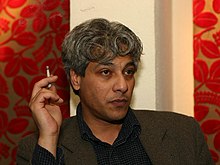This is an old revision of this page, as edited by Citation bot (talk | contribs) at 14:49, 17 September 2022 (Add: s2cid. | Use this bot. Report bugs. | Suggested by Abductive | #UCB_webform 2584/3850). The present address (URL) is a permanent link to this revision, which may differ significantly from the current revision.
Revision as of 14:49, 17 September 2022 by Citation bot (talk | contribs) (Add: s2cid. | Use this bot. Report bugs. | Suggested by Abductive | #UCB_webform 2584/3850)(diff) ← Previous revision | Latest revision (diff) | Newer revision → (diff) Dutch-Surinamese journalist
| Anil Ramdas | |
|---|---|
 | |
| Born | (1958-02-16)16 February 1958 Paramaribo, Suriname |
| Died | 16 February 2012(2012-02-16) (aged 54) Loenen aan de Vecht, Netherlands |
| Occupation(s) | Columnist, correspondent, journalist, television presenter, writer, essayist |
Anil Ramdas (Paramaribo, 16 February 1958 – Loenen aan de Vecht, 16 February 2012) was a Dutch-Surinamese columnist, correspondent, essayist, journalist, and TV and radio host. He was generally considered the V.S.Naipaul specialist of The Netherlands.
His work has been extensively studied by the author Karin Amatmoekrim.
In 1997 he was awarded the E. du Perron prize for all of his works.
Works
Fiction
Anil Ramdas published his autobiographical novel Badal in February 2011. In the article "A Matter of Identity: Anil Ramdas and His Autobiographical Novel Badal", Kees Snoek writes :
The novel Badal explores the evolution of the main character against the background of the confrontation between western and non-western civilisation. One of the examples Badal uses to make his point is Christopher Columbus: when during his journey into the unknown the supplies aboard his ship diminish, he has to make a decision: to turn back or to continue with his exploration. He decides to go on. It is the point of no return.
Death
Ramdas committed suicide on 16 February 2012. Dutch Prime Minister Mark Rutte expressed his regret about Ramdas' death in his weekly press conference.
References
- "Multicultural Netherlands: Anil Ramdas." Dutch Studies Program, UC Berkeley. Retrieved 1 December 2011. "Anil Ramdas — Multicultural Netherlands". Archived from the original on 20 February 2012. Retrieved 2 December 2011.
- "I Imagined the World Differently". Letterenfonds/. Dutch Foundation for Literature. Retrieved 25 December 2021.
- Codfried, Egmond. "Badal, or the Suicide of a Reformed Housenigger". Werkgroepcaraibischeletteren. Caraïbische letteren. Retrieved 27 December 2021.
- "Torch Global South Visiting Fellow". The Oxford Research Centre in the Humanities. University of Oxford. Retrieved 25 December 2021.
- "Anil Ramdas: Hope and Despair in Dutch Postcolonial Literature". The Oxford Research Centre in the Humanities. University of Oxford. Retrieved 25 December 2021.
- Literaire prijzen E. du Perron-prijs 1997 – Letterkundig Museum (in Dutch)
- Snoek, Kees (2 January 2018). "A matter of identity: Anil Ramdas and his autobiographical novel Badal (2011)". Dutch Crossing. 42 (1): 13. doi:10.1080/03096564.2018.1419631. S2CID 148989034. Retrieved 27 December 2021.
- Journalist en schrijver Anil Ramdas (54) overleden – NRC Handelsblad (in Dutch)
- NOS website vrijdag 17 februari 2012, 15:49. Retrieved 2 July 2013
- "Journalist and TV presenter Anil Ramdas dies". Expatica. Expatica Communications B.V. Retrieved 27 December 2021.
External links
- Breaking the ‘otherness’ fixation, an indepth analysis of the context "migration and identity" Anil Ramdas wrote and spoke extensively on.
- Anil Ramdas, a media resource base that lists some works of Anil Ramdas.
![]() Media related to Anil Ramdas at Wikimedia Commons
Media related to Anil Ramdas at Wikimedia Commons
- Godhra and After: The Role of Media India First Foundation – 6 April 2002
- 1958 births
- 2012 deaths
- Dutch journalists
- Dutch columnists
- Dutch essayists
- Dutch non-fiction writers
- Dutch television presenters
- Dutch television producers
- Dutch radio personalities
- Dutch people of Indian descent
- Dutch Hindus
- People from Paramaribo
- Surinamese emigrants to the Netherlands
- Suicides in the Netherlands
- 2012 suicides
- Surinamese Hindus